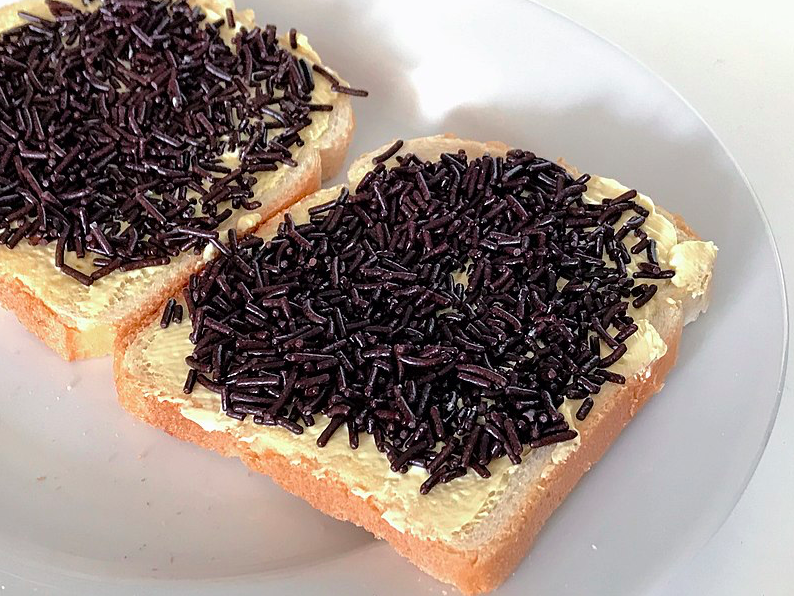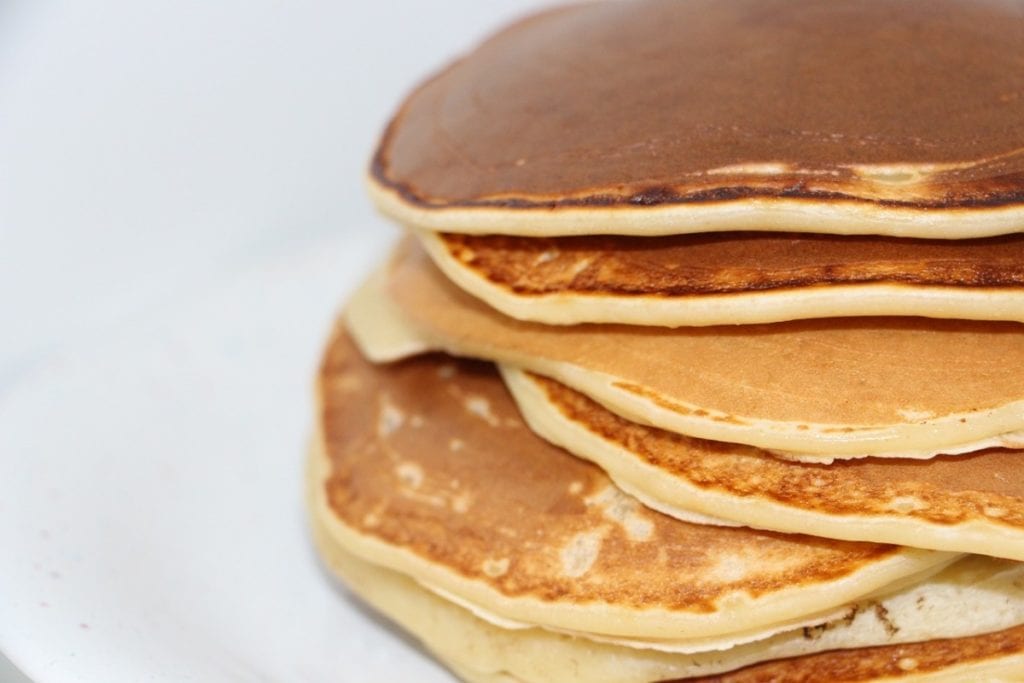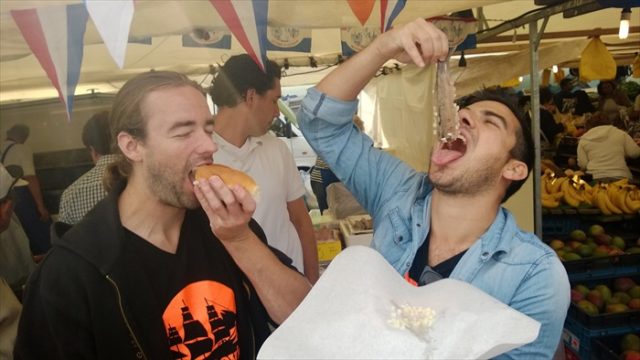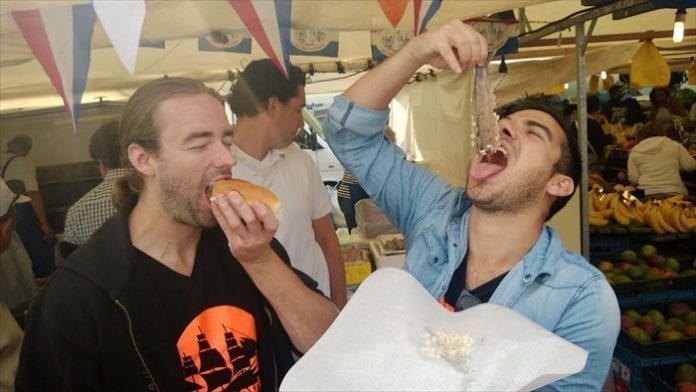The Dutch are often criticised for not having much in the way of ‘Dutch cuisine’ – it’s why amid hordes of Italian, Chinese and Mexican restaurants a Dutch restaurant is rarely found. However, the Netherlands does have some key items that residents or tourists can point to as particularly Dutch – but how Dutch are these?
What similar offerings of traditional Dutch food exist in other well-travelled expat countries, and what they are called? What might Hagelslag, pannenkoeken and stamppot resemble in nearby lands? And what do traditional ‘hell no’ foods for each country look like? Let’s see what the UK, USA and Australia have to offer:
Hagelslag on bread

Dutch hagelslag was created by B. E. Dieperink of Venco Candy Company in 1919, inspired by a severe hailstorm (thus the name hagelslag). In 1936 it was expanded by adding chocolate sprinkles and putting it on bread. That’s when things really caught on. The Venco founder claimed ads for hagelslag, which went back to 1910. These tasty sprinkles on bread continue to be a staple food.
Australia also lays a claim to the creation of sprinkles on bread in around 1920. White bread with butter covered in sprinkles and cut in triangles was a quick, cheap cake. Named ‘Fairy Bread,’ it is still a popular item there.
The USA, not to be outdone, “invented” sprinkles in the 1930s, called ‘Jimmies’. Two organizations claim this fame. One is the Just Born Candy Company named after the employee who ran the machine that made them. The other possible creator named Jimmies after a child in a Boston children’s cancer clinic. A doctor there created them and used them as an ice cream topping. They’re also found on doughnuts, cupcakes and cakes.
In the UK, they don’t care who invented them, they just put these so-called 100’s and 1000’s to good use on any dessert. Just don’t ask the French about who created them. They have used nonpareils since the 1700s.
Pannenkoeken
Another most noteworthy traditional Dutch food is pannenkoeken. It is a thin light pancake. Larger in diameter than its counterparts, it has anything-goes ingredients cooked into it. In addition, it can be eaten with a syrup topping, or with powdered sugar on it rolled up.

Australian, USA and UK pancakes or griddlecakes are thicker, and often stacked on the plate with butter and syrup. Australia has smaller, thicker pikelet pancakes, while the USA likes buttermilk larger thick ones. UK pancakes compare more to crepes. The names may vary too. In the USA, it’s either pancakes or flapjacks. In Australia and the UK, they are almost always pancakes, as flapjacks are a muesli or cereal bar there. On Shrove Tuesday (Fat Tuesday – pancake day) the UK has held pancake races in Olney since 1445, where people race while flipping pancakes in a pan as they race. Those zany Brits!
Stamppot: traditional Dutch comfort food
Stamppot springs from the Dutch tradition of obliterating multiple food groups by mashing them together as a winter comfort food. A sort of mix and mash. Potatoes, vegetables and even fruit are used. You get a great mixture of all flavours because how could you not when they are all mashed together? It’s a good way to get kids to eat their veggies.
In the UK they have something in this category called Bubble and Squeak. Where do Brits come up with these great names? It seems like a children’s cartoon show. It’s not. It is leftover mashed potatoes and cabbage with leftover vegetables mashed together.
Australia and the USA don’t have a countrywide tradition of running over things with a steamroller. The closest may be hash with hash/mashed browned potatoes. I am sure some area family favourite recipes exist.
Traditional ‘oh hell no’ food

Everywhere seems to have some ‘declared delicacy’ that challenges the strongest stomach, from sea slugs to monkey brains and fried spiders.
In the Netherlands, the traditional Dutch food offering from hell for visitors is not as terrifying as other countries. Maybe you can help me out here with other Dutch offerings? The most famous offering to torture tourists is slithering raw herring down your gullet without spilling your beer. Grab a fishtail and act like a sea lion. You love it or hate it. There is no in-between. I prefer herring in pieces with onions, but where’s the fun in that? Maybe you should just try herring ice cream instead!
What’s worse?
In the UK, haggis tops the list (just above black pudding). I realize times were rough centuries ago, but who made this up? It’s impossible to sell its virtues. “Hey, everyone! Stop by and get some ground-up sheep heart, lungs and liver mixed in with suet and oatmeal! Yum! But there’s more! It’s all sewn together in sheep intestines! Yay!”. Oddly, I’ve had haggis and it tastes better than it reads in print.
USA is BIG. Big on Rocky Mountain Oysters! Calf fries! You know… cattle testicles. Floured, seasoned and deep-fried! Sometimes pounded flat (seems like adding insult to injury). Huge crowds travel to festivals to consume this “delicacy” with magical properties (none). Check out this video:
Australia, however, takes the prize. They challenge even the most “I am starving but I will die first” foods. What could be better than a nice juicy, live Witchetty grub? Definitely not Dutch food. I am all for unusual foods, but a giant moth larvae? Why? We already know you are tough as nails in the land down under. No need to prove it by eating grubs. Even a barbecued grub seems insane, yet the indigenous peoples down under love them. Watch this, you city-dwelling Aussies:
So come on, Netherlands, you can do better! Or maybe it’s worse? In conclusion, either post your most mind gagging Dutch delicacy, or if you don’t have one, share one from around the world. It will help my diet when I lose my appetite!
Feature Image: Abuzer Van Leeuween

Dubbel zoute drop? 😉